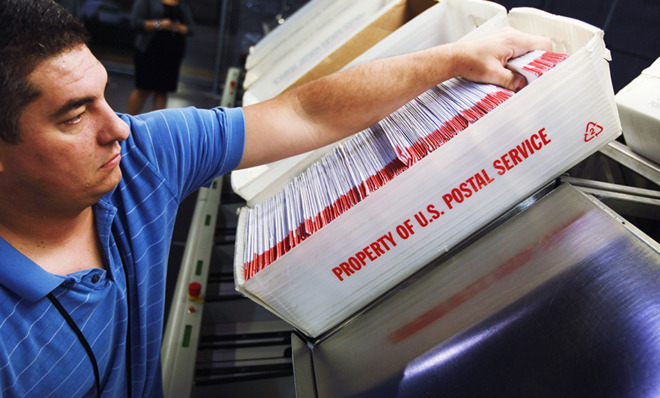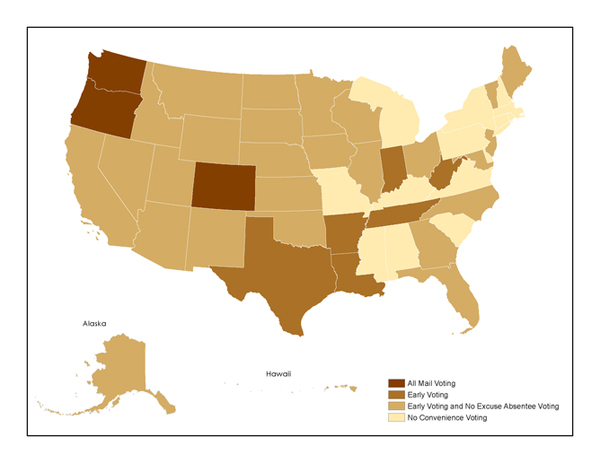Absentee voting doesn't increase turnout. It even leads to more mistakes.
Most reforms to make voting easier just make it easier for people who already vote

A free daily email with the biggest news stories of the day – and the best features from TheWeek.com
You are now subscribed
Your newsletter sign-up was successful

Although the midterms are typically referred to as federal elections, there is no federal entity that governs the conduct of elections in the U.S. There are basic election laws governing the timing of federal elections and basic non-discrimination laws, but in general, elections are governed by state laws. And it is across the states that there is wide variation in how people can vote.
We often think of voting technology in the United States as the punch cards used in the 2000 election, or the touch screen direct recording electronic (DRE) voting machines that people use today in different parts of the United States.
Since the 2000 election, almost every jurisdiction in the U.S. that had been using either punch cards or lever machines has switched to one of two options: either DRE machines or optical scan ballots. With these new voting mechanisms, after a voter fills in a circle next to the name of their chosen candidate, the ballot is scanned, the machine checks for errors, and finally the vote is counted. These newer voting technologies have resulted in fewer voters making mistakes on ballots because voters are given feedback when they skip a race on the ballot by accident or make a mark on a paper ballot that the scanner cannot interpret.
The Week
Escape your echo chamber. Get the facts behind the news, plus analysis from multiple perspectives.

Sign up for The Week's Free Newsletters
From our morning news briefing to a weekly Good News Newsletter, get the best of The Week delivered directly to your inbox.
From our morning news briefing to a weekly Good News Newsletter, get the best of The Week delivered directly to your inbox.
But not everyone votes in a polling place. As we see in the figure below, most states in the U.S. have some sort of convenience voting. In 27 states and the District of Columbia, a voter can vote by mail using no-excuse absentee voting, which means any registered voter can vote by mail without providing a reason. In three other states (Colorado, Oregon, and Washington), elections are held almost entirely by mail. In 33 states and DC, voters can cast ballots in the weeks prior to the election in person, at a limited number of polling places in their local jurisdiction, in early voting.

Recent studies have found that absentee voting is beneficial for some populations, especially individuals with disabilities. For many individuals with disabilities, getting to a polling place can be an arduous process. For these people, receiving a ballot in the mail can be the difference between not voting and voting and. Not surprisingly, turnout for individuals with disabilities is higher in jurisdictions where there is no-excuse absentee voting.
Receiving a ballot in the mail would seem to be an easy way to boost turnout. However, having no-excuse absentee voting or all-vote-by-mail elections does not boost turnout in most jurisdictions. For the habitual voter, convenience voting makes it easier for them to do what they were already going to do: vote. But as Adam Berinsky has noted, most reforms to make voting easier just make voting easier for people who already vote; they rarely result in getting those who do not vote to start voting.
Absentee voting also makes it easier for voters to make mistakes on their ballot when they vote because there is no feedback reminding them that they have made a mistake on their ballot. Unfortunately, absentee voters cannot vote on DREs and they cannot run their ballot through the optical scanner to see if they made a mistake.
A free daily email with the biggest news stories of the day – and the best features from TheWeek.com
This lack of feedback about mistakes is quite problematic; research by members of the Caltech/MIT Voting Technology Project found that, in California, as the number of by-mail voters increases, so does the rate of ballots containing errors that keep votes from being counted. Even though counties in California have adopted new voting technologies that reduce voting errors for voters who vote in person, the reduction in errors voting have been offset by an increase in errors by absentee voters.
In this year's election, we can expect more and more voters to cast ballots early and by mail. The question is whether more voters will make errors that result in their votes not counting.
Thad Hall does not work for, consult to, own shares in or receive funding from any company or organisation that would benefit from this article, and has no relevant affiliations.
More from The Conversation US...
-
 Political cartoons for February 18
Political cartoons for February 18Cartoons Wednesday’s political cartoons include the DOW, human replacement, and more
-
 The best music tours to book in 2026
The best music tours to book in 2026The Week Recommends Must-see live shows to catch this year from Lily Allen to Florence + The Machine
-
 Gisèle Pelicot’s ‘extraordinarily courageous’ memoir is a ‘compelling’ read
Gisèle Pelicot’s ‘extraordinarily courageous’ memoir is a ‘compelling’ readIn the Spotlight A Hymn to Life is a ‘riveting’ account of Pelicot’s ordeal and a ‘rousing feminist manifesto’
-
 The billionaires’ wealth tax: a catastrophe for California?
The billionaires’ wealth tax: a catastrophe for California?Talking Point Peter Thiel and Larry Page preparing to change state residency
-
 Bari Weiss’ ‘60 Minutes’ scandal is about more than one report
Bari Weiss’ ‘60 Minutes’ scandal is about more than one reportIN THE SPOTLIGHT By blocking an approved segment on a controversial prison holding US deportees in El Salvador, the editor-in-chief of CBS News has become the main story
-
 Has Zohran Mamdani shown the Democrats how to win again?
Has Zohran Mamdani shown the Democrats how to win again?Today’s Big Question New York City mayoral election touted as victory for left-wing populists but moderate centrist wins elsewhere present more complex path for Democratic Party
-
 Millions turn out for anti-Trump ‘No Kings’ rallies
Millions turn out for anti-Trump ‘No Kings’ ralliesSpeed Read An estimated 7 million people participated, 2 million more than at the first ‘No Kings’ protest in June
-
 Ghislaine Maxwell: angling for a Trump pardon
Ghislaine Maxwell: angling for a Trump pardonTalking Point Convicted sex trafficker's testimony could shed new light on president's links to Jeffrey Epstein
-
 The last words and final moments of 40 presidents
The last words and final moments of 40 presidentsThe Explainer Some are eloquent quotes worthy of the holders of the highest office in the nation, and others... aren't
-
 The JFK files: the truth at last?
The JFK files: the truth at last?In The Spotlight More than 64,000 previously classified documents relating the 1963 assassination of John F. Kennedy have been released by the Trump administration
-
 'Seriously, not literally': how should the world take Donald Trump?
'Seriously, not literally': how should the world take Donald Trump?Today's big question White House rhetoric and reality look likely to become increasingly blurred